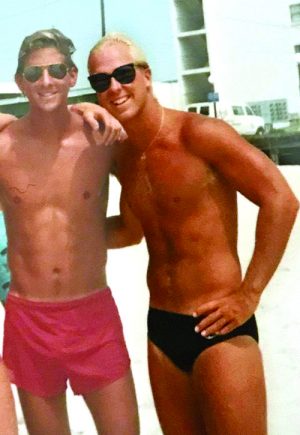
(Editor’s Note: The following is a series on the men and women who have spent their summers protecting all those who came to Ocean City for fun and safe vacation.)
OCEAN CITY — Scott McIntire was always a competitor and had put his drive for competition to good use, swimming for Towson University. When senior year came, he began looking for something else where he could put his talents to use and not just, “another summer of pool guarding and summer swim league coaching”. It was 1984 when his Towson teammate, Jeff Tilghman, told him about working summers for the Ocean City Beach Patrol, which had recently begun focusing on regional and national levels of lifeguard competitions. Tilghman said he was looking for one more roommate and McIntire jumped at the chance.
After passing a grueling test, he began his summer with the OCBP. He immediately excelled at the job and became over the years not only a top-notch guard, crew chief and officer, but also a member of the patrol’s landline competition team. Stemming from an actual lifesaving technique, the landline is four-person race and a main feature of beach patrol events. He said, “A landline is about 200 yards of nylon rope attached to a spool the size of a medium suitcase. You attach your rescue buoy with a brass clip to the end of the rope and with swim fins the rescuer swims out to the ‘victim’. The victim grabs the buoy and both the rescuer and victim are pulled in by other guards on the beach.”
McIntire and his team were good, and one day they got a chance to prove just how good.
“In 1995, a hurricane off the Carolina coast had blown the surf to a solid 6-8 feet, with rips opening up everywhere,” McIntire recalled. “That morning my crew had been practicing landline rescues for the upcoming crew competition and was still laid out in the sand when Kirby King spotted two people in a huge rip next to the 48th Street rock jetty. My roommate William “Rio” Bails was coming down to cover the radio, while I was at water’s edge backing up Kirby.”
It was then McIntire made the decision to use the landline for the rescue.
“I had been a landline rescuer in beach comps and Rio and Kirby were my pullers for crew comps,” he said. “Unfortunately, Kirby was on the rescue, I was swimming out to him and that left only Rio as a puller. Captain Schoepf quickly started recruiting men on the beach, fathers and teenage sons … anybody who could help. The coach in Captain Schoepf took over and in the two to three minutes it took me to get to Kirby and his two victims, the captain had organized a dozen beach patrons into a landline crew.
“Getting pulled in by two strong guards is actually exhilarating. Getting pulled in by a dozen people on the beach was life threatening. Kirby and I had two extremely panicked men on the buoy. We told them to hang on tight as I waved to signal the shore to start pulling us in. The only way to describe that ride was like the start of the ‘Rockin roller coaster’ at Universal Studios in Orlando.
“The trouble was that one of the men panicked and tried to get on top of the buoy instead of staying on his back. This pushed Kirby completely underwater. We both kept our grasp on that buoy and I had to use my free hand to keep lifting Kirby’s head up by his hair so he could breathe. When we reached the shore, we saw over a dozen guards and beach patrons in various stages of exhaustion and Captain Schoepf going to each one and congratulating them.”
McIntire lives in Frankford, Del. with his wife, Jami, and their son Josh. He coaches a USA swimming club and his son is on the USLA National Open Team that competed in South Africa last fall.
